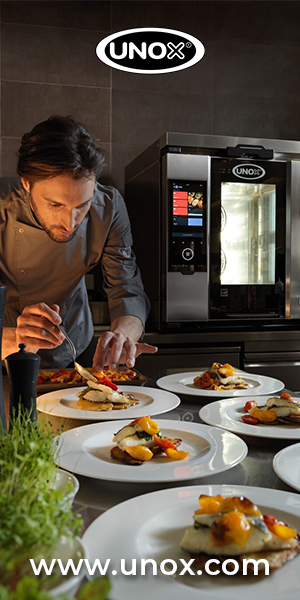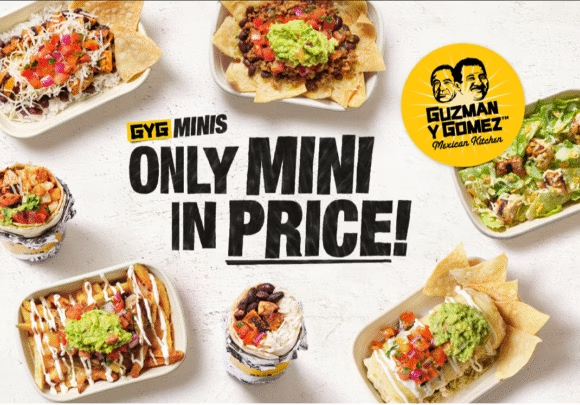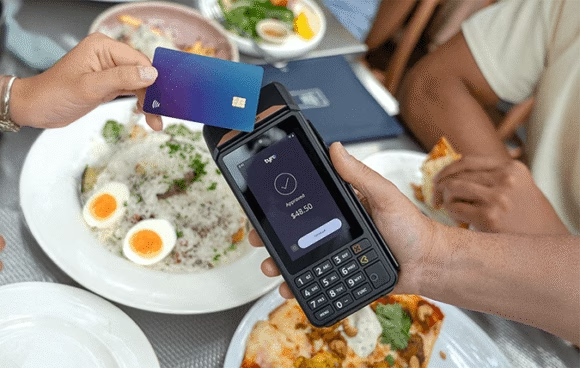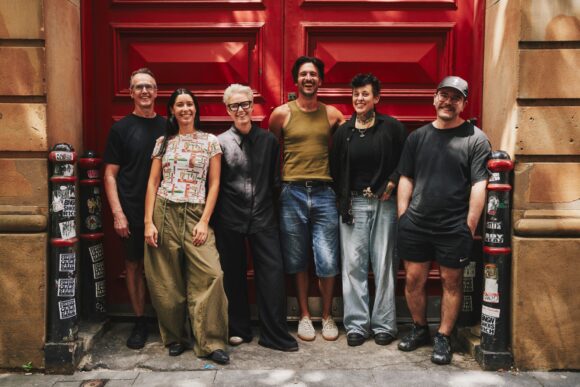The RB Big Interview series brings you in-depth conversations with the industry’s most influential leaders, innovators, and visionaries who are shaping the future of Australia’s restaurant and hospitality landscape.
Costa Anastasiadis knows what it takes to build something from the ground up—twice. After successfully growing and selling Crust Pizza, he dove straight back into the hospitality trenches 12 years ago, founding Zeus Street Greek. What started as a bold bet on bringing authentic Greek street food to Australian diners has evolved into one of the country’s most beloved fast-casual chains.
With more than 25 years in hospitality, Costa’s success goes beyond business acumen—it’s his genuine curiosity and passion for the industry that sets him apart. He’s always asking questions, digging deeper, driven by a fascination with food, people, and the experiences that bring them together.
You sold the Crust Pizza business a few years ago. What made you want to jump back into the fast casual space?
It was really our destiny. I grew up in a family of publicans that had pubs and hotels. And I was always involved in the bistros and the restaurants, and I loved it. The success of Crust was really the opportunity to pursue our passion for our Hellenic heritage and Greek background. As a very proud Australian, this country gave us everything. My grandparents came here with nothing. What better way to talk about our love of Australia and our heritage through food – it’s the perfect medium for that. The premium land we lived in with Crust was a great segue to Greek food, allowing us to talk about it in a casual, more elevated way. And that’s the catalyst for how Zeus was founded.
There wasn’t really anything like Zeus on the market in that fast-casual space—how big was the opportunity?
There still isn’t anything like it, and we definitely saw the opportunity. The vision for Zeus has always been to be Australia’s most-loved Greek food brand. We’re doing that in many different ways. But what we found was a sea of the same when it comes to burgers, chicken, Mexican and pizza chains. The love affair we have with the Greek and Mediterranean diet has been there for decades, and quintessential Australians have an affinity for it. There’s a lot of overlap with Greek and Australian barbecue. But no one really understood what Greek street food was. And the portability and the casualness with the quality of what we’re doing was really the opportunity. That’s held us in great stead, allowing us to keep growing over the last 12 years.
Australians take ownership of a cuisine, and people can feel very passionate about Greek food because they know there’s such a big Greek community here. How do you walk that line between authenticity and approachability?
You want to always pay homage to your traditional recipes, and you can walk a tightrope, because certain things wouldn’t cut through. But if you cherry-pick the best of what resonates, blend it with Australian consumer sentiment, and modernise it, you can bring it home. Pita wraps are a great hangover cure for late nights, and we thought, isn’t that an excellent opportunity to reinvent them and do it better?
When you talk about authenticity, it’s interesting because in Greece, pork and chicken are really the proteins everyone needs. We had pork on our menu, and it’s polarising. People love it or just don’t eat it. So we decided to remove pork last year and introduce beef. Beef is sometimes eaten in Greek culture, but not a lot. It’s about being smart about the nuances of the Australian consumer—what they gravitate toward—and then weaving that into the business.
How involved are you in menu development? And where do recipes and ideas come from?
Development is a long process that has to tick many boxes. Fortunately, it’s never a one-person show—it’s a real collaboration. We’ve got a very skilled team of product developers meeting with operations that put it together. Formats and occasions can dictate it. By ‘formats’, I mean what’s best represented in a 50-square-metre kiosk, and what occasions are we targeting? Because we are really a high-quality convenience offering, we know what people are looking for.
We know our consumers from Gen X to Y and Millennials, and many of these consumers are looking for products that offer the opportunity to indulge but are generally better for you. With our Spartan bowls, they tick the box for gym junkies looking for protein and some good carbs. And then, if you want to be cheeky, you can get your halloumi chips and have a more decadent meal with loukoumades, a Greek spin on doughnuts. We look at traditional Greek recipes and how we bring them into the current realm of what’s on trend and what people want—while staying authentic. There’s always a risk of getting too far left or too far right. You have to be careful.
You offer plant-based options and dietary accommodations. How has that changed for you as a business leader in terms of needing to cater to those requirements? How do you bring that inclusivity into your brand positioning?
It’s a great question. Dietary inclusivity goes far beyond brand positioning for us. The Greek-Mediterranean diet is built on tradition and culture. Greek Orthodox Christians fast throughout the week and at significant times of the year—and they usually fast from protein. So over thousands of years, we’ve got a fantastic assortment of different vegetarian and plant-based options. This is nothing new for us, and we feel very comfortable with it. For us, it’s all about how we source and prepare our products. We’re leaning into the philosophy of food, and so the philosophy of food is really about everything good for you.
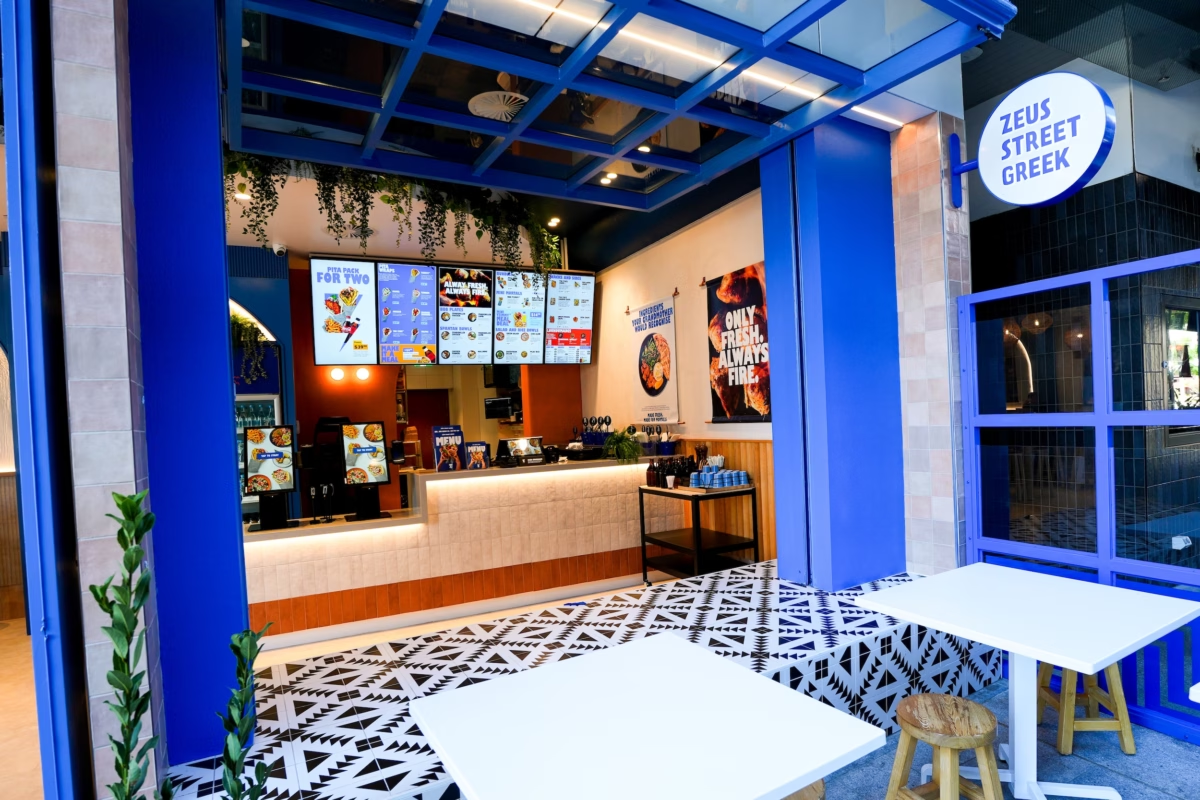
Let’s talk about your retail products in Woolworths — it’s big in the UK, with restaurant brands launching convenience products and offering consumers the opportunity to enjoy restaurant-quality taste at home. What is your retail strategy? How do grocery-ready products fit into your business and brand?
When you look at the Greek Mediterranean diet across Australia, although we’ve got a significant diaspora in this country, in a retail environment, it’s a new category. We have a lot of Old El Paso Mexican and Asian meal kits, so there’s really no playbook for growing a Mediterranean QSR brand in supermarkets.
We saw this partnership as an opportunity to educate a market, which gives us the chance to reach parts of the country we just couldn’t reach before, like Townsville, Cairns, Broome, and Albury. The products are in 800 stores across the country.
It educates the market, allowing us to build brick-and-mortar stores in those areas, and the foreign becomes familiar. I’ve been on site visits to Canberra, where we have a couple of stores. I’m walking the aisles of Woolworths, and people are grabbing our meal kits, and then I’m out talking to leasing agents and negotiating a site, 150 metres from Woolworths.
We’re fortunate Woolworths wants to build out a Greek category. They see how in-home dining with brands is a big opportunity. And they have all the data in the world to see there’s an opportunity here, and they know the best way to penetrate is to partner with established brands—we fit that for them. That’s just great timing.
What’s been your biggest learning in scaling Greek street food rather than pizza?
Building brand awareness and loyalty takes time and resources because we’ve had to spend 12 years educating people. Pizza is a very mature market, and still performs incredibly well on Friday and Saturday night because it feeds the family well.
Running a pizza store operationally is less challenging. We have full-blown kitchens, and we’re dealing with protein. From a cost-of-goods perspective, they’re very different when managing proteins like lamb. Your theoretical cost of goods versus your actual cost is something we’ve learned to be careful with. You’re barbecuing protein, so you’ll experience yield loss. Operationally, it’s a very different beast.
You’ve got to remember everything we’ve been dealt with over the last 10 years. There’s been that much change with the likes of Uber coming along, and then everything that happened with COVID. Hospitality has really gone through the ringer, and it’s been survival of the fittest. Make no mistake about it. It’s not for the faint-hearted.
How do you keep that positive mindset going as you scale the business that brings people on the journey with you?
For us, it’s pretty exciting that we’re the only Greek Mediterranean QSR brand in the country. In a sea of burgers, Mexican, chicken, and pizza, our unique positioning is holding us in good stead.
Secondly, our uncompromising direction on quality is really shining through. And people know the difference between Zeus and a non-direct competitor. And then, in the end, the business needs to stack up commercially. We work very hard on margin expansion and have great conversations with our supply chain partners. The advantage we have with growth and scale is the ability to lock in the supply chain and forecast future products and growth. At 45 stores, we provide our franchise partners with the security of the business and, in turn, absolute clarity on margins.
Make no mistake, there are always curveballs. You will get margin impacts from time to time, but we’re big enough now that the surprises are less frequent. Partners want security, and as much as they love the brand, the collaborations, the product, it’s a business, so a return on investment is critical.
What does the ideal Zeus Street Greek location look like for you?
That’s interesting, because there really isn’t one. The right High Street location is undoubtedly what we look at. But entertainment and dining precincts have been integral to our growth. More recently, smaller-format stores — express stores — in hybrid food courts. Food courts that trade later than 3pm with the ability to tap into delivery. That’s been our three key focus points in terms of formats.
The really exciting phase we’re entering is drive-throughs, and we’ve got great opportunities coming in the next 12 months. We’ve got to be mindful we’re not trying to be everything to everyone. So again, picking the right location is critical. There will be expansion into day parts, which means a breakfast offering. Late night is also really interesting for us, because we’re seeing a lot of consumers looking to eat after 9pm.
We need density, traffic drivers, and revenue generators like universities, hospitals, a workforce, and a good residential area. Our super-regional areas, such as Albury, Newcastle, and Wollongong, have been exceptional. Regional areas offer a unique opportunity for Zeus, where options are generally limited, and going in with a fresh, high-quality Greek Mediterranean offering is working a treat. We’ll continue to grow the regional business.
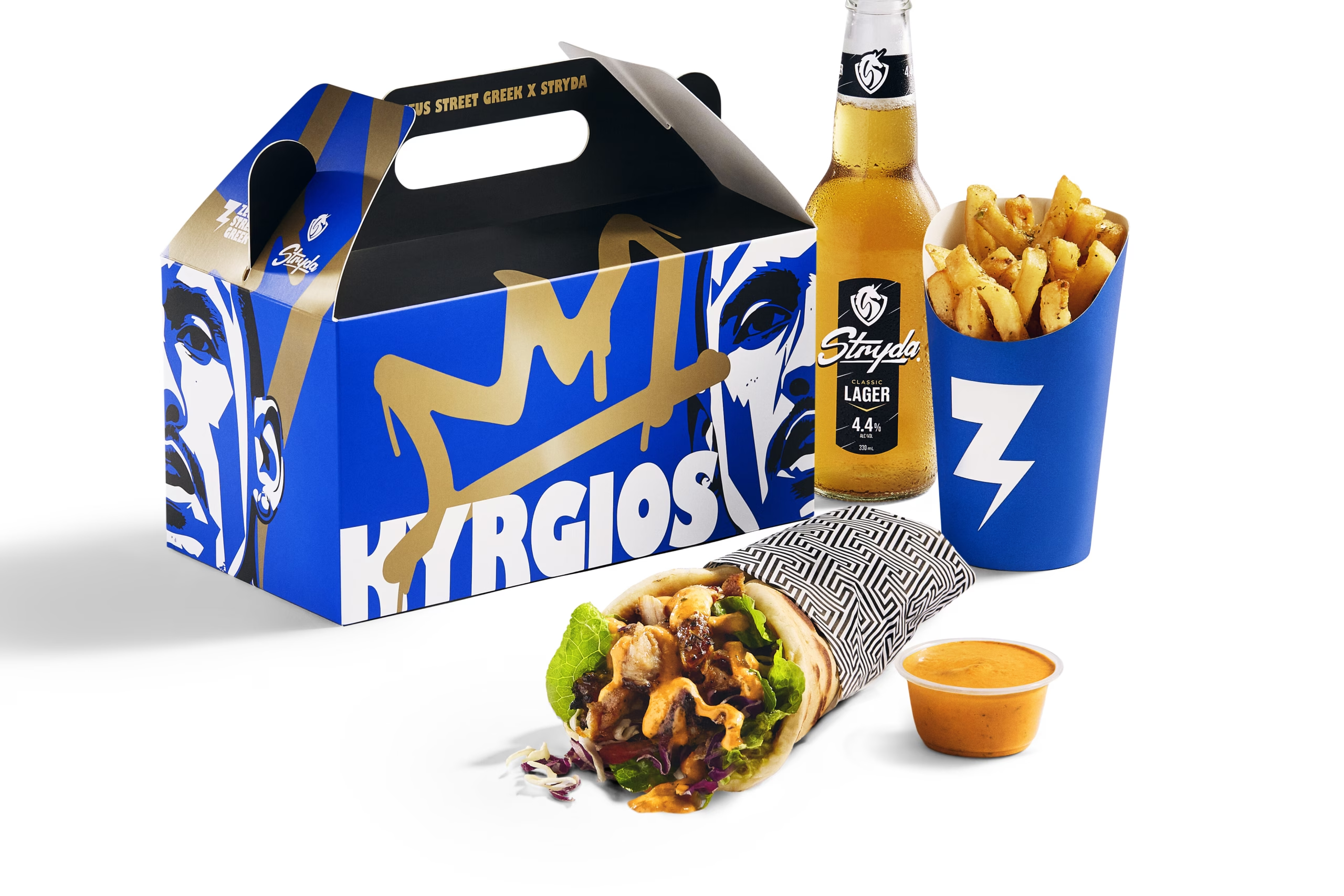
Let’s talk about how you’re seeing the industry at the moment. What’s your kind of sentiment? How are you managing rising costs and the labour challenges and all those things that we hear about at the moment that are hard?
Yeah, it’s a real thing. There’s definitely data to suggest that people are trading down to elevated QSR. But there are still pressures around managing your cost of goods and labour. They are the two biggest.
We’ve actually created a proprietary AI platform that gives our restaurant managers a tool for managing labour, so scaling up or down for peaks and troughs is really important for today’s restaurant manager. We are investing in tech to give our guys the best advantage and help manage labour costs.
For example, having the ability to predict revenue with an AI tool for our business: if you’re overstaffed on a particular day and inclement weather is coming, it will prompt your staff to know that in-store dining will be lower tonight. You could knock off one or two people. It gives you the ability to manoeuvre the roster, which is critical—if you haven’t got fluidity in your roster and the ability to manage labour in real time, you could be costing yourself 3-4% a week.
AI has been a real advantage, and we’re still working to fine-tune and improve. There are some real goals there, so we’re embracing it.
You’ve got some exciting plans for expansion in the next five years. Can you talk about those ambitions? It sounds like Zeus Street Greek is more than ready for the next stage of growth.
The biggest opportunity for us is our market position as the only elevated Greek-Mediterranean QSR brand in the country. In fact, globally, I’d say we’re one of only three. We have 45 stores trading currently, and we’ve got 15 stores in the pipeline for the next eight months that we’re building. The objective is to open 18 to 20 stores annually. By 2030, we will have 150 stores trading across the country.
It’s so unique that we have been able to scale this brand to almost 50 stores, and we are the only player in the market. And we need to seize the opportunity and get there quickly, because we want to ensure that we become the brand favourite.
We believe there are 400 locations over the next 10 years. We have a significant interest in growing the grocery footprint until the Greek-Mediterranean category is embraced. Once you become stable, international hospitality brands start talking to you, and we’ve had multiple conversations. There is a lot of appetite in the UAE and the UK, so we’ve had preliminary discussions, but we’re probably about 24 months away from that, because resources and capital are required. But anything’s possible. We’re excited about what the future holds and about building a great team and doing great collaborations, being very strategic about who we partner with.
If you rolled the clock back 12 years and gave yourself a piece of advice before you opened that first location, what would it be?
I made some notes on this one because I thought, geez, where do I start?! Firstly, slow and steady is really important because we’re serial hospitality guys, we love scaling and growing. But the landscape of the last 10 years has been just so unstable. Slow and steady for me would be critical, because if you go too quickly and repeat mistakes, it’s very difficult to undo them.
The other learning is that every business is different. What we did at Crust doesn’t necessarily work at Zeus. Even though it’s all, it’s hospitality. You need to be really careful about the mindset that it’s a one-size-fits-all approach. It is not the case.
Embrace the changing landscape—how do you adapt while staying true to your brand and core values? This is everything. You’ve got to figure out ways to actually fit within it, not go against it, as much as you can. If you don’t look to adapt, you can easily fall off the bandwagon in the industry.


